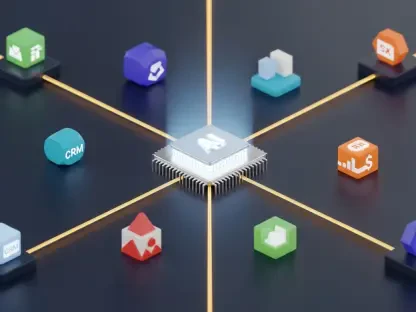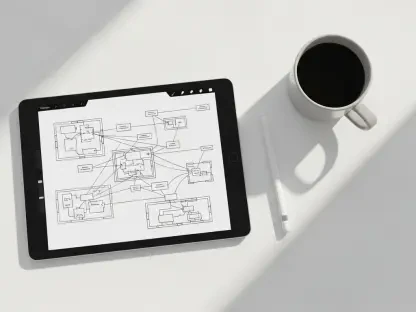In an era where industrial downtime can cost companies millions of dollars annually, the ability to predict and prevent equipment failures before they occur has become a critical priority for manufacturers worldwide. ROHM Semiconductor has stepped into this arena with a groundbreaking solution through their AI-enabled microcontrollers, specifically the ML63Q253x-NNNxx and ML63Q255x-NNNxx series. These devices, heralded as the first of their kind, perform both learning and inference directly on the unit, bypassing the need for cloud connectivity or external processing power. This innovation marks a significant leap forward for predictive maintenance, offering real-time anomaly detection and failure prediction in industrial environments. With ROHM’s proprietary Solist-AI™ technology at the core, these MCUs address pressing challenges such as minimizing operational disruptions and slashing maintenance costs, particularly in settings where regular inspections or skilled technicians are scarce. This advancement transforms predictive maintenance from a distant aspiration into a tangible, actionable strategy for industries aiming to enhance efficiency.
The Power of Standalone AI in Predictive Maintenance
Revolutionizing Edge Computing
ROHM’s AI MCUs are at the forefront of the shift toward edge computing in industrial AI, a trend gaining momentum due to concerns over latency, security, and operational costs associated with cloud-based systems. By processing data locally, these microcontrollers eliminate reliance on external networks, ensuring faster response times and heightened data protection. This standalone capability is particularly crucial in remote or connectivity-challenged environments where consistent internet access cannot be guaranteed. Experts at ROHM emphasize that this approach not only mitigates cybersecurity risks but also reduces communication expenses, making it a practical choice for industries seeking reliable maintenance solutions. The ability to operate independently positions these MCUs as a cornerstone for the future of predictive maintenance, enabling smarter, more autonomous systems that adapt to specific operational contexts without external dependencies.
The impact of edge computing through ROHM’s technology extends beyond mere convenience, addressing fundamental inefficiencies in traditional maintenance practices. By embedding AI learning and inference directly into the device, these MCUs can analyze sensor data in real time, learning the normal operating state of equipment like industrial motors. When deviations occur, an anomaly score is generated to signal potential issues, allowing for proactive interventions. This localized processing ensures that critical decisions are made instantaneously, without the delays inherent in cloud-dependent systems. Furthermore, the reduced need for constant data transmission minimizes bandwidth usage, offering economic benefits alongside operational ones. As industries increasingly prioritize self-sufficient solutions, ROHM’s innovation aligns perfectly with the growing demand for robust, on-site intelligence in maintenance strategies.
Transforming Maintenance Paradigms
Beyond edge computing, ROHM’s AI MCUs redefine how predictive maintenance is implemented across industrial sectors by focusing on early fault detection. These devices continuously monitor parameters such as temperature, current, and rotational speed, establishing a baseline for normal equipment behavior. Any deviation from this norm triggers an alert, quantified as an anomaly score, which serves as an early warning system for potential failures. This capability proves invaluable in preventing unexpected breakdowns that could halt production lines and incur substantial losses. By shifting maintenance from a reactive to a proactive model, industries can schedule repairs at optimal times, avoiding costly disruptions and extending the lifespan of critical machinery.
Additionally, the standalone nature of Solist-AI™ technology ensures that these benefits are accessible even in the most challenging environments. In remote industrial sites where skilled labor is limited, or frequent inspections are logistically difficult, the ability to detect and address equipment issues without external support is a game-changer. The MCUs’ design prioritizes data security by keeping sensitive information local, a significant advantage in an era where cyber threats loom large. This self-contained approach not only enhances reliability but also builds trust among operators wary of external vulnerabilities. As a result, ROHM’s solution empowers industries to maintain operational continuity with minimal overhead, setting a new benchmark for maintenance efficiency and resilience in diverse settings.
Key Features and Industrial Applications
Tailored for Real-World Challenges
ROHM’s AI MCUs are meticulously engineered to meet the specific demands of industrial applications, with a particular focus on motor systems where early detection of failures is paramount. These devices excel at identifying subtle changes in operational parameters, such as vibrations or current fluctuations, which might indicate issues like bearing wear or load misalignment. By providing real-time insights through anomaly scores transmitted to a host microcontroller, the technology enables timely interventions that prevent minor issues from escalating into major disruptions. This targeted approach ensures that industries can maintain smooth operations, especially in high-stakes environments where equipment reliability directly impacts productivity and profitability.
The practical utility of these MCUs extends to a wide array of industrial contexts, demonstrating their versatility in addressing real-world challenges. Whether deployed in manufacturing plants, energy facilities, or transportation infrastructure, the ability to monitor equipment health continuously offers a significant edge over traditional maintenance methods. The technology’s focus on predictive capabilities means that potential faults are identified long before they manifest as critical failures, reducing the risk of unplanned downtime. Moreover, by tailoring the system to detect specific anomalies relevant to motor-driven equipment, ROHM ensures that the solution is not a one-size-fits-all but a precise tool for enhancing operational stability. This adaptability makes it an indispensable asset for industries navigating complex maintenance needs.
Seamless Integration and Support
Ease of integration stands as a hallmark of ROHM’s AI MCUs, designed to be retrofitted into existing systems through standard serial interfaces, thereby minimizing the need for extensive overhauls. This compatibility allows industries to upgrade their maintenance strategies without significant investment in new infrastructure. Additionally, ROHM provides robust support through development tools like Solist-AI™ Sim for pre-deployment testing on a PC and Solist-AI™ Scope for real-time performance monitoring. These resources simplify the adoption process, making advanced AI technology accessible to companies regardless of their technical expertise. Such user-friendly features lower the entry barrier, enabling a broader range of organizations to leverage predictive maintenance effectively.
Further enhancing deployment, ROHM’s “Ecosystem Partner” program fosters collaboration with specialists in PCB design, manufacturing, and AI integration, ensuring a smooth transition for businesses adopting this technology. This initiative addresses common hurdles faced by companies lacking in-house AI capabilities, offering tailored guidance and support throughout the implementation phase. Evaluation boards and availability through major distributors also facilitate rapid prototyping and scaling, allowing industries to test and deploy solutions swiftly. By combining technical innovation with comprehensive support, ROHM ensures that the benefits of their AI MCUs are not confined to tech-savvy enterprises but extend to diverse industrial players seeking to modernize maintenance practices with minimal friction.
Efficiency and Future Potential
Unmatched Performance Metrics
ROHM’s AI MCUs distinguish themselves with exceptional energy efficiency and processing speed, critical factors in meeting the rigorous demands of industrial monitoring. Powered by the AxlCORE-ODL AI accelerator, these devices achieve inference speeds up to 1,000 times faster than traditional software-based methods while consuming only tens of milliwatts of power. This remarkable performance ensures that real-time anomaly detection is not only feasible but also sustainable, even in power-constrained environments. Such efficiency translates into lower operational costs and aligns with the industry’s push for greener, more resource-conscious technologies, making these MCUs a standout choice for forward-thinking enterprises.
The technical prowess of these MCUs is further underscored by their ability to handle complex AI tasks within a compact, low-power framework. Built on an Arm Cortex-M0+ core and equipped with essential peripherals like A/D converters and CAN controllers, they deliver robust functionality without compromising on energy use. This balance of speed and efficiency caters to the urgent need for instantaneous decision-making in predictive maintenance, where delays can result in significant setbacks. By optimizing both performance and power consumption, ROHM’s solution addresses a critical gap in the market, offering industries a tool that enhances reliability without straining resources or budgets.
Expanding Horizons
Looking ahead, ROHM is committed to broadening the scope of Solist-AI™ technology, with plans to expand the product lineup to address emerging industrial needs and applications. This forward-thinking strategy reflects an understanding that predictive maintenance requirements will evolve alongside technological advancements and industry demands. The versatility of the current MCUs suggests potential applications beyond motor systems, possibly extending into areas like smart infrastructure or renewable energy equipment monitoring. Such scalability positions ROHM as a leader in adaptable AI solutions, ready to meet diverse challenges with innovative responses tailored to specific contexts.
The future potential of these AI MCUs also lies in their capacity to integrate with broader industrial ecosystems, enhancing overall system intelligence. As industries move toward fully autonomous operations, the ability of Solist-AI™ to learn and adapt on-site will become increasingly vital. ROHM’s dedication to continuous improvement and partnership development ensures that the technology will not remain static but will grow to incorporate new functionalities and use cases. This proactive approach promises to keep the MCUs at the cutting edge of predictive maintenance, offering industries a reliable pathway to optimize operations, reduce costs, and embrace the next wave of industrial innovation with confidence.









